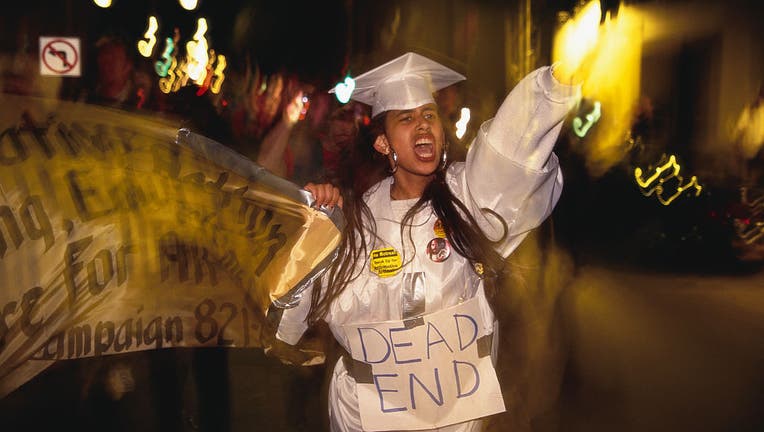Affirmative action effort in California faces uphill battle; polling shows Prop. 16 is struggling

A woman donning a graduation gown protests the University of California board of regents' decision to end affirmative action. (Photo by David Butow/Corbis via Getty Images)
SAN FRANCISCO - A national awakening on race has driven a well-funded campaign in California to reinstate affirmative action in public hiring, contracting and college admissions, with voters deciding Tuesday whether to allow the nation’s most populated state to grant preferential treatment based on race and gender.
But public polling indicates that Proposition 16 is struggling, suggesting that voters may not be ready to repeal a quarter-century-old ban on affirmative action. Supporters have raised $31 million and include chambers of commerce, professional sports, tech companies and Democratic leaders. They say affirmative action programs are critical to undoing generations of systemic racism and sexism that holds back people of color and women.
In contrast, opponents have raised $1.6 million, fueled by smaller donations from a grassroots network that includes Chinese immigrants worried that public universities will bypass Asian American applicants with higher scores and grades in favor of lower-scoring African American and Latino students. They say discrimination should stay illegal.
“Its prospects are not great,” said Mark DiCamillo, director of a poll conducted by the Institute of Governmental Studies at the University of California, Berkeley. “My only explanation is that it’s fallen between the cracks.”
The survey of likely voters released Oct. 26 shows 49% opposed and 38% in favor, with greater support in the San Francisco Bay Area and Los Angeles but trailing everywhere else. A poll by the Public Policy Institute of California indicated similar trends.
The measure is polling evenly among Latinos and women, the survey shows. Democrats and African Americans appear to be supporting it and there is less support among men and white people, the poll suggests.
Proposition 16 would repeal a ban on affirmative action programs approved by voters in 1996, when the state was less diverse and more Republican. That ban was pushed in large part by Pete Wilson, the Republican governor at the time, in a campaign that galvanized voters.
DiCamillo said he’s not seeing that kind of energy for its repeal.
“I’m not faulting the campaign,” he said. “It’s among many other things that are going on in people’s lives, with the pandemic and the fires. And the presidential election is sucking all the oxygen out of everything.”
Nicole Derse, a senior strategist for supporters of the measure, said advocates knew they had a lot of ground to cover quickly after California lawmakers placed the repeal on the ballot in June — a relatively short time for campaigning. The issue requires explaining, but she thinks the message is getting through.
“When voters actually tune in, and they look at ‘what does this ballot measure really do and who’s on what side,’ they come our way,” she said. “We feel good. It’s going to be close, and it’s going to be a lot of hustle.”
African American businessman Ward Connerly was an ally of then-Gov. Wilson and a University of California regent when he spearheaded the campaign to end affirmative action in 1996. Now 81, Connerly is back to defend his legacy, saying the polling shows California voters understand what’s at stake.
“Discrimination is wrong no matter how you package it,” he said. “In 1996, the people of California said they did not want to use skin color and sex and your ancestry as the basis for public policymaking, and they’re saying the same thing right now.”

